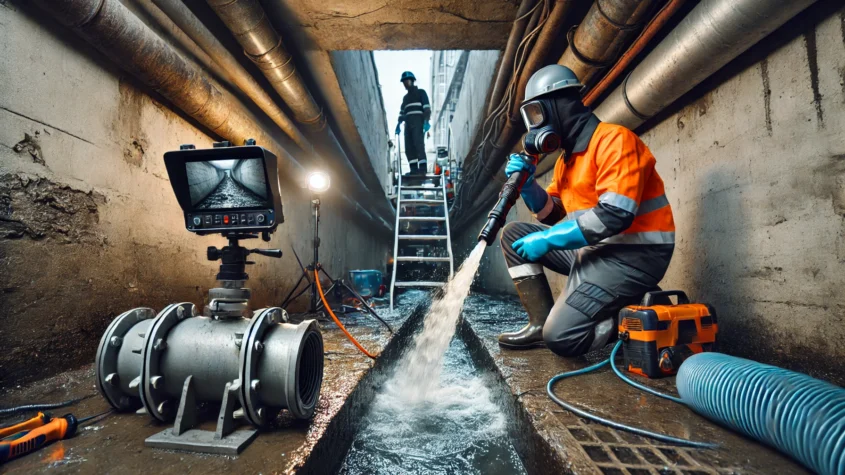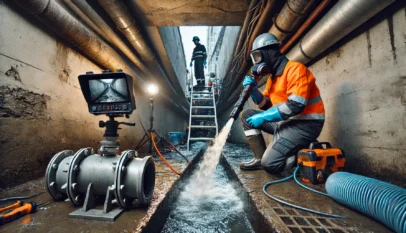
Drain cleaning is a necessary part of maintaining a healthy plumbing system. Over time, drains can become clogged with hair, grease, soap scum, and other debris, leading to slow drainage, unpleasant odors, or even backups. Regular cleaning removes blockages and helps prevent costly damage or plumbing emergencies.
Knowing how to recognize the signs of a clog and choosing the appropriate cleaning method is important. Simple blockages can often be cleared with household solutions, but more stubborn problems may require professional tools and techniques like hydro jetting. Proper maintenance extends the life of the pipes and keeps the system running smoothly.
By understanding basic drain cleaning methods and when to call a professional, homeowners can avoid common plumbing issues and maintain a safe, functional home environment. This knowledge empowers them to act quickly and effectively when problems arise.
Understanding Drain Cleaning
Drain cleaning involves removing blockages and buildup in plumbing systems to restore proper water flow. It helps maintain healthy pipes and prevents more serious plumbing issues. Knowing what causes clogs and recognizing the warning signs can help homeowners address problems before they worsen.
What Is Drain Cleaning
Drain cleaning is the process of mechanically or chemically removing debris, grease, hair, soap scum, and other obstructions from drainage pipes. This can be done through methods such as plunging, snaking, hydro-jetting, or using chemical cleaners. It ensures wastewater flows freely and prevents backups.
Proper drain cleaning goes beyond just clearing a temporary blockage. It involves fully clearing the pipe to avoid recurring issues and potential water damage. Professionals often use cameras to inspect pipes and choose the best cleaning method based on the clog’s nature and location.
Common Causes of Clogged Drains
Clogs often result from accumulated substances that do not easily dissolve in water. Common causes include:
- Hair buildup in bathroom drains
- Grease and fat hardening in kitchen pipes
- Food particles that slip through garbage disposals
- Soap scum that collects inside pipes
- Foreign objects accidentally flushed or dropped
Over time, these materials stick together and narrow the pipe diameter, restricting water flow. Tree roots penetrating underground pipes can also cause blockages, especially in older plumbing systems.
Signs Your Drains Need Cleaning
Several indicators point to clogged or slow drains:
- Slow draining sinks, tubs, or showers
- Gurgling sounds when water drains
- Water backing up in fixtures
- Unpleasant odors around drains
- Frequent sewer backups or multiple drain backups simultaneously
Ignoring these signs can lead to pipe damage or leaks. Timely drain cleaning can prevent these complications and avoid costly repairs.
Effective Drain Cleaning Methods
Drain cleaning can be approached through various techniques depending on the severity and type of clog. Some methods involve basic tools, others require chemical agents, while more stubborn blockages might need professional intervention.
Manual Drain Cleaning Tools
Manual tools like plungers, drain snakes, and hand augers are common first steps for clearing clogs. A plunger works by creating suction to dislodge blockages near the drain’s surface. Drain snakes, flexible wires inserted into pipes, can reach deeper to break up or retrieve debris.
These tools are cost-effective and suitable for minor to moderate clogs caused by hair, grease, or small objects. However, they require some skill to avoid pipe damage. Regular use of a drain snake can prevent buildup, but it’s important to stop if resistance increases to avoid harming the plumbing system.
Chemical Drain Cleaners: Pros and Cons
Chemical cleaners are popular for their convenience and quick action. They use acids or caustic substances to dissolve organic matter like hair and grease. Many available products target specific clog types, such as enzymatic cleaners that break down biodegradable material.
Despite their ease of use, chemical cleaners pose risks. Strong chemicals can corrode pipes, especially older metal plumbing. They may also harm septic systems and the environment if misused. Users should follow instructions carefully and avoid combining different chemicals, which can cause dangerous reactions.
Professional Drain Cleaning Services
Professionals use advanced equipment such as hydro jetting and motorized drain snakes to address severe or persistent clogs. Hydro jetting employs high-pressure water streams to clean pipe walls thoroughly, removing buildup and debris. Motorized snakes extend reach and power for tough blockages beyond the scope of manual tools.
Hiring experts ensures safe handling of plumbing systems and identification of underlying issues like pipe damage or root intrusion. Professional cleaning also includes inspection services using cameras to prevent future problems. This option is best for serious clogs or when previous DIY methods have failed.
British Virgin Islands Company Registration Guide for Seamless Offshore Setup
Registering a company in the British Virgin Islands (BVI) is a straightforward process tha…









